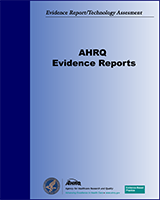NCBI Bookshelf. A service of the National Library of Medicine, National Institutes of Health.
Williams JW, Plassman BL, Burke J, et al. Preventing Alzheimer's Disease and Cognitive Decline. Rockville (MD): Agency for Healthcare Research and Quality (US); 2010 Apr. (Evidence Reports/Technology Assessments, No. 193.)
This publication is provided for historical reference only and the information may be out of date.
Table 73Summary of evidence for association between social/economic/behavioral factors and AD or cognitive decline
| Exposure | Childhood exposures | Education/occupation | Social engagement | Other leisure activities | Alcohol | Tobacco | Physical activity in late adults | Cognitive engagement | ||
|---|---|---|---|---|---|---|---|---|---|---|
| Design | Cohort | Cohort | Cohort | Cohort | Cohort | Cohort | Cohort | RCT | Cohort | RCT |
| Studies (subjects) | 1 (859) | Education: 11 (25196) Occupation: 5 (6029) | Marital status: 3 (6699) Social network: 1 (1473) Social support: 2 (4365) | 2 (7464) | 6 (14,646) | 12 (21,718) | 12 (25,603) | None | 4 (7723) | None |
| Association with AD* | No association | Education: Decreased risk Occupation: No | Never married: Increased risk Less social network: Increased risk Less social support: Increased risk | Inconsistent association | Decreased risk | Increased risk | Probably decreased risk | - | Decreased risk | - |
| Studies (subjects) | 3 (6,861) | Education: 14 (43201) Occupation: 4 (7277) | Marital status/cohabitation: 7 (16565) Social network: 5 (10926) Social support: 5 (15459) | 3 (9599) | 7 (15,581) | 14 (33685) | 8 (17351) | 1 (170) | 4 (6285) | 1 (2802) |
| Association with cognitive decline* | No association | Education: Inconsistent association Occupation: Possibly decreased risk | Marital status: Inconsistent association Social network: Inconsistent association Social support: Inconsistent association | Probably decreased risk | No association | Increased risk | Probably decreased risk | Decreased risk | Probably decreased risk | Slightly decreased risk |
| Concordance/discordance for AD and cognitive decline outcomes | Concordant for no association Exposure measure variable. | Education: Discordant Occupation: Evidence inadequate | Evidence inadequate to determine | Evidence inadequate to determine | Discordant | Concordant for increased risk | Concordant for decreased risk but exposure measures variable and imprecise; little trial data; cognitive decline measured variably | Concordant for decreased risk but exposure measures imprecise and variable; little trial data | ||
Abbreviations: AD = Alzheimer’s disease; RCT = randomized controlled trial
- *
Direction of risk for higher exposure (intake) and AD or cognitive decline.
- Table 73, Summary of evidence for association between social/economic/behavioral...Table 73, Summary of evidence for association between social/economic/behavioral factors and AD or cognitive decline - Preventing Alzheimer's Disease and Cognitive Decline
Your browsing activity is empty.
Activity recording is turned off.
See more...
